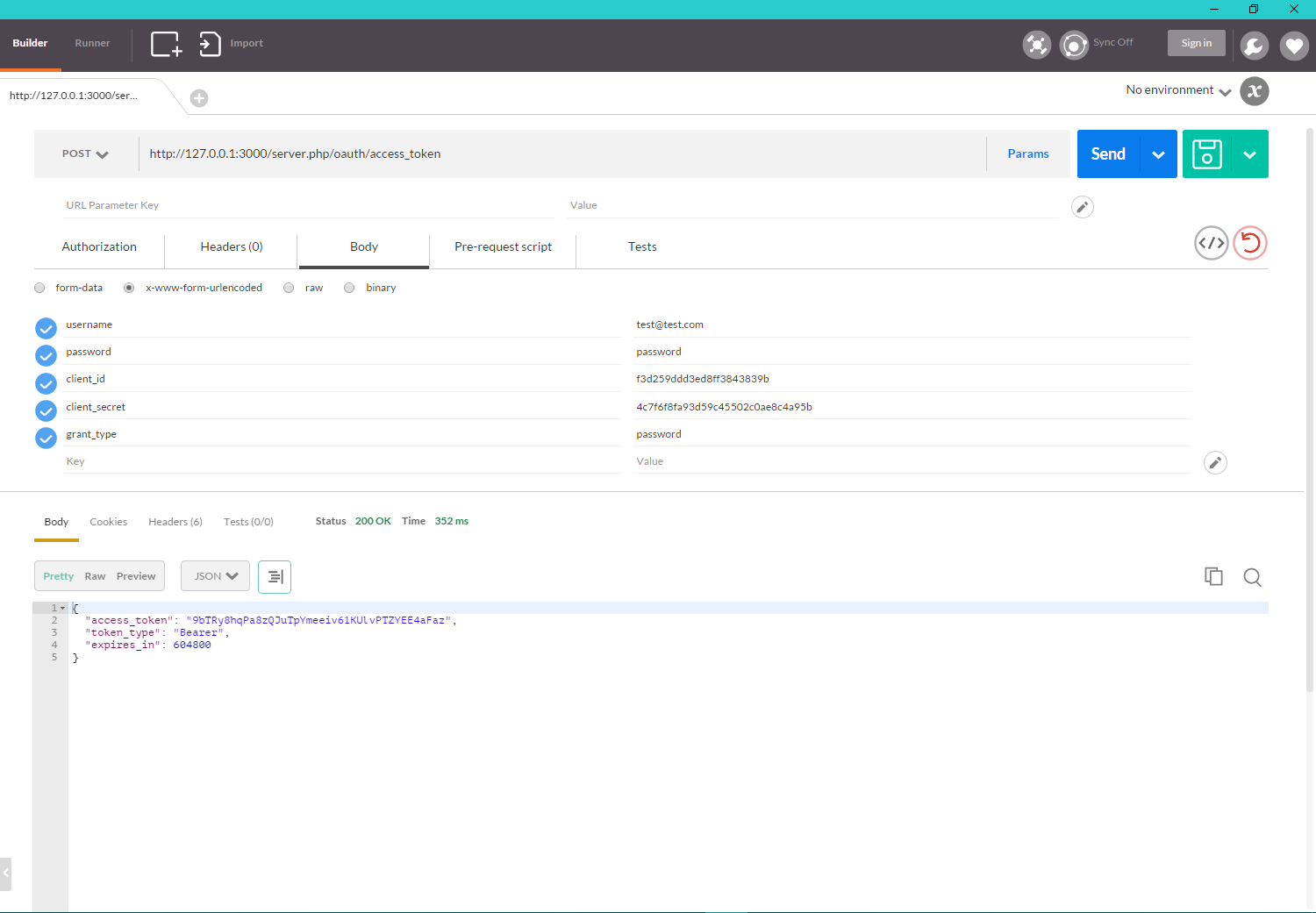You are here
用 Laravel 搭建带 OAuth2 oauth oauth2.0 2.0 验证的 RESTful 服务 有大用 有大用
星期五, 2017-08-04 14:41 — adminshiping1
2.修改
3.在
在
4.在你的
5.在你的项目里运行
添加这些配置项在
配置你的
6.在
7.在数据库的
{
用 Laravel 搭建带 OAuth2 验证的 RESTful 服务
原文请看我的博客: 用Laravel搭建带Oauth2验证的RESTful服务
Github源码请看这里: Laravel-RESTful-Service
参考了 Laravel 5 token based Authentication (OAuth 2.0) & Dingo Wiki,但是原文中有一些bug,而且不适用最新的5.2版本,我的教程里解决了这些问题。
1.全新安装Laravel并配置好你的数据库,我在这里用的是mysql.#
composer global require "laravel/installer"
laravel new restful2.修改 composer.json 并在命令行运行 composer update 添加两个包.#
"require": {
"php": ">=5.5.9",
"laravel/framework": "5.2.*",
//下面这两个是新添加的,注意版本号
"dingo/api": "1.0.*dev",
"lucadegasperi/oauth2-server-laravel": "5.1.*"
}
换句话说 就是执行:
composer.bat require dingo/api:1.0.x@dev
composer.bat require lucadegasperi/oauth2-server-laravel3.在 config/app.php 文件里添加新的 providers.#
<?php 'providers' => [ //Add bottom lines to your providers array. /** * Customized Service Providers... */ //本来原文少了这个App\Providers\OAuthServiceProvider::class, //出现access_token验证不通过 会报下面的错 ,详细的错见本网页的最后//"message": "Failed to authenticate because of bad credentials or an invalid authorization header.", App\Providers\OAuthServiceProvider::class, Dingo\Api\Provider\LaravelServiceProvider::class, LucaDegasperi\OAuth2Server\Storage\FluentStorageServiceProvider::class, LucaDegasperi\OAuth2Server\OAuth2ServerServiceProvider::class, ],
在 aliases 里添加下面的内容:#
<?php
'aliases' => [
//Add bottom lines to your aliases array.
'Authorizer' => LucaDegasperi\OAuth2Server\Facades\Authorizer::class,
],4.在你的 app/Http/Kernel.php 文件里添加新的 $middleware & $routeMiddleware.#
<?php
protected $middleware = [
//Add bottom lines to your $middleware array.
\LucaDegasperi\OAuth2Server\Middleware\OAuthExceptionHandlerMiddleware::class,
];
//
protected $routeMiddleware = [
//Add bottom lines to your $routeMiddleware array.
'oauth' => \LucaDegasperi\OAuth2Server\Middleware\OAuthMiddleware::class,
'oauth-user' => \LucaDegasperi\OAuth2Server\Middleware\OAuthUserOwnerMiddleware::class,
'oauth-client' => \LucaDegasperi\OAuth2Server\Middleware\OAuthClientOwnerMiddleware::class,
'check-authorization-params' => \LucaDegasperi\OAuth2Server\Middleware\CheckAuthCodeRequestMiddleware::class,
];5.在你的项目里运行 php artisan vendor:publish & php artisan migrate .#
添加这些配置项在 .env 文件里,具体含义可以查看Dingo Wiki:#
API_STANDARDS_TREE=x
API_SUBTYPE=rest
API_NAME=REST
API_PREFIX=api
API_VERSION=v1
API_CONDITIONAL_REQUEST=true
API_STRICT=false
API_DEBUG=true
API_DEFAULT_FORMAT=json配置你的 app\config\oauth2.php 文件:#
<?php
//Modify the $grant_types as follow.
'grant_types' => [
'password' => [
'class' => 'League\OAuth2\Server\Grant\PasswordGrant',
'access_token_ttl' => 604800,
// the code to run in order to verify the user's identity
'callback' => 'App\Http\Controllers\VerifyController@verify',
],
],6.在 routes.php 文件添加我们需要的路由.#
<?php
//Add the following lines to your routes.php
/**
* OAuth
*/
//Get access_token
Route::post('oauth/access_token', function() {
return Response::json(Authorizer::issueAccessToken());
});
//Create a test user, you don't need this if you already have.
Route::get('/register',function(){$user = new App\User();
$user->name="tester";
$user->email="test@test.com";
$user->password = \Illuminate\Support\Facades\Hash::make("password");
$user->save();
});
/**
* Api
*/
$api = app('Dingo\Api\Routing\Router');
//Show user info via restful service.
$api->version('v1', ['namespace' => 'App\Http\Controllers'], function ($api) {
$api->get('users', 'UsersController@index');
$api->get('users/{id}', 'UsersController@show');
});
//Just a test with auth check.
$api->version('v1', ['middleware' => 'api.auth'] , function ($api) {
$api->get('time', function () {
return ['now' => microtime(), 'date' => date('Y-M-D',time())];
});
});7.在数据库的 oauth_client 表里添加一条 client 数据用来测试. 例如phphub就是github API的一个client#
INSERT INTO `oauth_clients` (`id`, `secret`, `name`, `created_at`, `updated_at`) VALUES
(‘f3d259ddd3ed8ff3843839b’, ‘4c7f6f8fa93d59c45502c0ae8c4a95b’, ‘Main website’, ‘2015–05–12 21:00:00’, ‘0000–00–00 00:00:00’);8.编写你的 API Controller.#
随便叫什么 Book,Post,User 都好,这是一个举例:
<?php
namespace App\Http\Controllers;
use App\User;
use App\Http\Controllers\Controller;
class UsersController extends Controller
{
public function index()
{
return User::all();
}
public function show($id)
{
return User::findOrFail($id);
}
}9.开始测试吧!#
其实已经初步完工了,接下来我们要测试刚才配置好的服务,一般会用到一个Chrome应用 PostMan 来模拟请求你的服务器,当然你也可以用自己的办法.



本帖已被设为精华帖!
{
"message": "Failed to authenticate because of bad credentials or an invalid authorization header.",
"status_code": 401,
"debug": {
"line": 113,
"file": "D:\\xampputf8\\htdocs\\laravelOauth\\vendor\\dingo\\api\\src\\Auth\\Auth.php",
"class": "Symfony\\Component\\HttpKernel\\Exception\\UnauthorizedHttpException",
"trace": [
"#0 D:\\xampputf8\\htdocs\\laravelOauth\\vendor\\dingo\\api\\src\\Auth\\Auth.php(96): Dingo\\Api\\Auth\\Auth->throwUnauthorizedException(Array)",
"#1 D:\\xampputf8\\htdocs\\laravelOauth\\vendor\\dingo\\api\\src\\Http\\Middleware\\Auth.php(52): Dingo\\Api\\Auth\\Auth->authenticate(Array)",
"#2 [internal function]: Dingo\\Api\\Http\\Middleware\\Auth->handle(Object(Dingo\\Api\\Http\\Request), Object(Closure))",
"#3 D:\\xampputf8\\htdocs\\laravelOauth\\vendor\\laravel\\framework\\src\\Illuminate\\Pipeline\\Pipeline.php(136): call_user_func_array(Array, Array)",
"#4 [internal function]: Illuminate\\Pipeline\\Pipeline->Illuminate\\Pipeline\\{closure}(Object(Dingo\\Api\\Http\\Request))",
"#5 D:\\xampputf8\\htdocs\\laravelOauth\\vendor\\laravel\\framework\\src\\Illuminate\\Routing\\Pipeline.php(32): call_user_func(Object(Closure), Object(Dingo\\Api\\Http\\Request))",
"#6 D:\\xampputf8\\htdocs\\laravelOauth\\vendor\\dingo\\api\\src\\Http\\Middleware\\PrepareController.php(45): Illuminate\\Routing\\Pipeline->Illuminate\\Routing\\{closure}(Object(Dingo\\Api\\Http\\Request))",
"#7 [internal function]: Dingo\\Api\\Http\\Middleware\\PrepareController->handle(Object(Dingo\\Api\\Http\\Request), Object(Closure))",
"#8 D:\\xampputf8\\htdocs\\laravelOauth\\vendor\\laravel\\framework\\src\\Illuminate\\Pipeline\\Pipeline.php(136): call_user_func_array(Array, Array)",
"#9 [internal function]: Illuminate\\Pipeline\\Pipeline->Illuminate\\Pipeline\\{closure}(Object(Dingo\\Api\\Http\\Request))",
"#10 D:\\xampputf8\\htdocs\\laravelOauth\\vendor\\laravel\\framework\\src\\Illuminate\\Routing\\Pipeline.php(32): call_user_func(Object(Closure), Object(Dingo\\Api\\Http\\Request))",
"#11 [internal function]: Illuminate\\Routing\\Pipeline->Illuminate\\Routing\\{closure}(Object(Dingo\\Api\\Http\\Request))",
"#12 D:\\xampputf8\\htdocs\\laravelOauth\\vendor\\laravel\\framework\\src\\Illuminate\\Pipeline\\Pipeline.php(103): call_user_func(Object(Closure), Object(Dingo\\Api\\Http\\Request))",
"#13 D:\\xampputf8\\htdocs\\laravelOauth\\vendor\\laravel\\framework\\src\\Illuminate\\Routing\\Router.php(726): Illuminate\\Pipeline\\Pipeline->then(Object(Closure))",
"#14 D:\\xampputf8\\htdocs\\laravelOauth\\vendor\\laravel\\framework\\src\\Illuminate\\Routing\\Router.php(699): Illuminate\\Routing\\Router->runRouteWithinStack(Object(Illuminate\\Routing\\Route), Object(Dingo\\Api\\Http\\Request))",
"#15 D:\\xampputf8\\htdocs\\laravelOauth\\vendor\\laravel\\framework\\src\\Illuminate\\Routing\\Router.php(675): Illuminate\\Routing\\Router->dispatchToRoute(Object(Dingo\\Api\\Http\\Request))",
"#16 D:\\xampputf8\\htdocs\\laravelOauth\\vendor\\dingo\\api\\src\\Routing\\Adapter\\Laravel.php(81): Illuminate\\Routing\\Router->dispatch(Object(Dingo\\Api\\Http\\Request))",
"#17 D:\\xampputf8\\htdocs\\laravelOauth\\vendor\\dingo\\api\\src\\Routing\\Router.php(513): Dingo\\Api\\Routing\\Adapter\\Laravel->dispatch(Object(Dingo\\Api\\Http\\Request), 'v1')",
"#18 D:\\xampputf8\\htdocs\\laravelOauth\\vendor\\dingo\\api\\src\\Http\\Middleware\\Request.php(126): Dingo\\Api\\Routing\\Router->dispatch(Object(Dingo\\Api\\Http\\Request))",
"#19 [internal function]: Dingo\\Api\\Http\\Middleware\\Request->Dingo\\Api\\Http\\Middleware\\{closure}(Object(Dingo\\Api\\Http\\Request))",
"#20 D:\\xampputf8\\htdocs\\laravelOauth\\vendor\\laravel\\framework\\src\\Illuminate\\Pipeline\\Pipeline.php(150): call_user_func(Object(Closure), Object(Dingo\\Api\\Http\\Request))",
"#21 D:\\xampputf8\\htdocs\\laravelOauth\\vendor\\lucadegasperi\\oauth2-server-laravel\\src\\Middleware\\OAuthExceptionHandlerMiddleware.php(36): Illuminate\\Pipeline\\Pipeline->Illuminate\\Pipeline\\{closure}(Object(Dingo\\Api\\Http\\Request))",
"#22 [internal function]: LucaDegasperi\\OAuth2Server\\Middleware\\OAuthExceptionHandlerMiddleware->handle(Object(Dingo\\Api\\Http\\Request), Object(Closure))",
"#23 D:\\xampputf8\\htdocs\\laravelOauth\\vendor\\laravel\\framework\\src\\Illuminate\\Pipeline\\Pipeline.php(136): call_user_func_array(Array, Array)",
"#24 D:\\xampputf8\\htdocs\\laravelOauth\\vendor\\laravel\\framework\\src\\Illuminate\\Foundation\\Http\\Middleware\\CheckForMaintenanceMode.php(44): Illuminate\\Pipeline\\Pipeline->Illuminate\\Pipeline\\{closure}(Object(Dingo\\Api\\Http\\Request))",
"#25 [internal function]: Illuminate\\Foundation\\Http\\Middleware\\CheckForMaintenanceMode->handle(Object(Dingo\\Api\\Http\\Request), Object(Closure))",
"#26 D:\\xampputf8\\htdocs\\laravelOauth\\vendor\\laravel\\framework\\src\\Illuminate\\Pipeline\\Pipeline.php(136): call_user_func_array(Array, Array)",
"#27 [internal function]: Illuminate\\Pipeline\\Pipeline->Illuminate\\Pipeline\\{closure}(Object(Dingo\\Api\\Http\\Request))",
"#28 D:\\xampputf8\\htdocs\\laravelOauth\\vendor\\laravel\\framework\\src\\Illuminate\\Pipeline\\Pipeline.php(103): call_user_func(Object(Closure), Object(Dingo\\Api\\Http\\Request))",
"#29 D:\\xampputf8\\htdocs\\laravelOauth\\vendor\\dingo\\api\\src\\Http\\Middleware\\Request.php(127): Illuminate\\Pipeline\\Pipeline->then(Object(Closure))",
"#30 D:\\xampputf8\\htdocs\\laravelOauth\\vendor\\dingo\\api\\src\\Http\\Middleware\\Request.php(103): Dingo\\Api\\Http\\Middleware\\Request->sendRequestThroughRouter(Object(Dingo\\Api\\Http\\Request))",
"#31 [internal function]: Dingo\\Api\\Http\\Middleware\\Request->handle(Object(Illuminate\\Http\\Request), Object(Closure))",
"#32 D:\\xampputf8\\htdocs\\laravelOauth\\vendor\\laravel\\framework\\src\\Illuminate\\Pipeline\\Pipeline.php(136): call_user_func_array(Array, Array)",
"#33 [internal function]: Illuminate\\Pipeline\\Pipeline->Illuminate\\Pipeline\\{closure}(Object(Illuminate\\Http\\Request))",
"#34 D:\\xampputf8\\htdocs\\laravelOauth\\vendor\\laravel\\framework\\src\\Illuminate\\Routing\\Pipeline.php(32): call_user_func(Object(Closure), Object(Illuminate\\Http\\Request))",
"#35 [internal function]: Illuminate\\Routing\\Pipeline->Illuminate\\Routing\\{closure}(Object(Illuminate\\Http\\Request))",
"#36 D:\\xampputf8\\htdocs\\laravelOauth\\vendor\\laravel\\framework\\src\\Illuminate\\Pipeline\\Pipeline.php(103): call_user_func(Object(Closure), Object(Illuminate\\Http\\Request))",
"#37 D:\\xampputf8\\htdocs\\laravelOauth\\vendor\\laravel\\framework\\src\\Illuminate\\Foundation\\Http\\Kernel.php(132): Illuminate\\Pipeline\\Pipeline->then(Object(Closure))",
"#38 D:\\xampputf8\\htdocs\\laravelOauth\\vendor\\laravel\\framework\\src\\Illuminate\\Foundation\\Http\\Kernel.php(99): Illuminate\\Foundation\\Http\\Kernel->sendRequestThroughRouter(Object(Illuminate\\Http\\Request))",
"#39 D:\\xampputf8\\htdocs\\laravelOauth\\public\\index.php(54): Illuminate\\Foundation\\Http\\Kernel->handle(Object(Illuminate\\Http\\Request))",
"#40 {main}"
]
}
}
普通分类:
